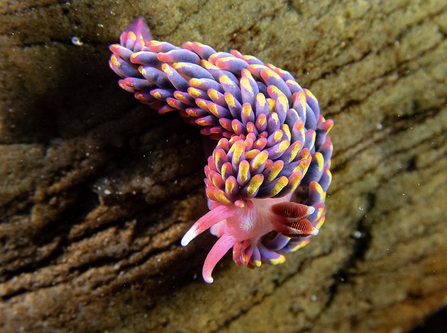Innovation, research and a mammoth volunteering effort helped conservationists learn more about wildlife in UK seas, reveals The Wildlife Trusts’ 2024 marine review [view here], published today.
Seaside volunteers clocked over 46,000 thousand hours surveying shorelines and recording wildlife. In Devon, this amazing contribution amounted to more than 700 hours.
Discoveries reported in the annual round-up include climate-indicator sea slugs and seaweeds, plus sightings of conger eels and humpback whales.
The Wildlife Trusts – and 80% of the British public – want to see bottom trawling banned in protected areas, and measures to ensure that offshore developments are nature positive. The charities say that strengthening protection of the UK’s blue carbon can help to achieve climate and biodiversity goals.
Coral Smith is Devon Wildlife Trust’s Marine Awareness Officer. Based at the charity’s popular Wembury Marine Centre, near Plymouth, Coral said:
"It has been another fantastic year for marine wildlife sightings in Devon. Out to sea we’ve had dolphins and whales and spectacular displays from Bluefin tuna, as they continue their comeback in local waters. Closer to shore it’s been a good year for Cuttlefish, Spider crabs and all kinds of weird and wonderful invertebrates including Devon’s first record of a Rainbow sea slug, Babakina anadonis. The appearance of this beautiful nudibranch is, however, a warning that our waters are warming!
It’s also been a tough year for marine wildlife in many ways. We’ve seen high numbers of Invasive Non-Native Species (INNS) recorded along both the north and south coastlines of Devon during the surveys conducted by our volunteers. Our volunteer Shoresearch team also continue to find disturbing quantities of ocean plastics, bycatch [dead dolphins, seals, whales and sharks accidentally caught in fishing nets] and ‘ghost’ [abandoned] fishing gear. Add to this are the continued and well-publicised water quality concerns affecting many of our estuaries and bathing waters.

